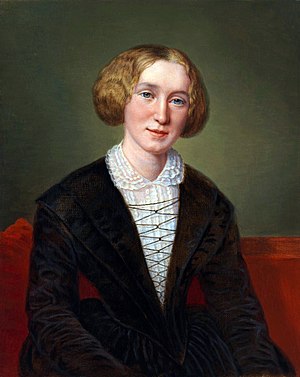
If a man has a capacity for great thoughts, he is likely to overtake them before he is decrepit.
Share this quote:
Ignorance gives one a large range of probabilities.
Share this quote:
The prevarication and white lies which a mind that keeps itself ambitiously pure is as uneasy under as a great artist under the false touches that no eye detects but his own, are worn as lightly as mere trimming when once the actions have become a lie.
Share this quote:
...theres never a garden in all the parish but what theres endless waste in it for want o somebody as could use everything up. Its what I think to myself sometimes, as there need nobody run short o victuals if the land was made the most on, and there was never a morsel but what could find its way to a mouth.
Share this quote:
Blessed is the man who, having nothing to say, abstains from giving us wordy evidence of the fact.
Share this quote:
If we had a keen vision and feeling of all ordinary human life, it would be like hearing the grass grow and the squirrels heart beat, and we should die of that roar which lies on the other side of silence.
Share this quote:
We are overhasty to speak as if God did not manifest himself by our silent feeling, and make his love felt through ours.
Share this quote:
Aye, aye, thats the way wi thee: thee allays makes a peck o thy own words out o a pint o the Bibles
Share this quote:
Let a prejudice be bequeathed, carried in the air, adopted by hearsay, caught in through the eye,–however it may come, these minds will give it a habitation; it is something to assert strongly and bravely, something to fill up the void of spontaneous ideas, something to impose on others with the authority of conscious right; it is at once a staff and a baton.
Share this quote:
It is just that I don’t know how I could live without the hope of her. It would be like learning to live with wooden legs.
Share this quote:
A man carries within him the germ of his most exceptional action; and if we wise people make eminent fools of ourselves on any particular occasion, we must endure the legitimate conclusion that we carry a few grains of folly to our ounce of wisdom.
Share this quote:
Favourable Chance, I fancy, is the god of all men who follow their own devices instead of obeying a law they believe in. Let even a polished man of these days get into a position he is ashamed to avow, and his mind will be bent on all the possible issues that may deliver him from the calculable results of that position. Let him live outside his income, or shirk the resolute honest work that brings wages, and he will presently find himself dreaming of a possible benefactor, a possible simpleton who may be cajoled into using his interest, a possible state of mind in some possible person not yet forthcoming. Let him neglect the responsibilities of his office, and he will inevitably anchor himself on the chance that the thing left undone may turn out not to be of the supposed importance. Let him betray his friends confidence, and he will adore that same cunning complexity called Chance, which gives him the hope that his friend will never know. Let him forsake a decent craft that he may pursue the gentilities of a profession to which nature never called him, and his religion will infallibly be the worship of blessed Chance, which he will believe in as the mighty creator of success. The evil principle deprecated in that religion is the orderly sequence by which the seed brings forth a crop after its kind.
Share this quote:
It is a mere cowardice to seek safety in negations. No character becomes strong in that way. You will be thrown into the world some day and then every rational satisfaction your nature that you deny now will assault like a savage appetite.
Share this quote:
The secret of our emotions never lies in the bare object, but in its subtle relations to our own past.
Share this quote:
I dont see how a man is to be good for much unless he has some one woman to love him dearly.
Share this quote:
A man vows, and yet will not east away the means of breaking his vow. Is it that he distinctly means to break it? Not at all; but the desires which tend to break it are at work in him dimly, and make their way into his imagination, and relax his muscles in the very moments when he is telling himself over again the reasons for his vow.
Share this quote:
He was one of those men, and they are not the commonest, of whom we can know the best only by following them away from the marketplace, the platform, and the pulpit, entering with them into their own homes, hearing the voice with which they speak to the young and aged about their own hearthstone, and witnessing their thoughtful care for the everyday wants of everyday companions, who take all their kindness as a matter of course, and not as a subject for panegyric.
Share this quote:
Modesty, not temper.
Share this quote:
Author describes one characters optimism as, that quiet well-being which perhaps you and I have felt on a sunny afternoon when, in our brightest youth and health, life has opened a new vista for us, and long to-morrows of activity have stretched before us like a lovely plain which there was no need for hurrying to look at, because it was all our own.
Share this quote:
It is a narrow mind which cannot look at a subject from various points of view.
Share this quote: